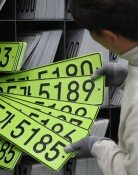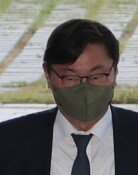Acting President Hwang calls NSC at base bunker
Acting President Hwang calls NSC at base bunker
Posted March. 07, 2017 07:05,
Updated March. 07, 2017 07:13

At the committee held at 9 a.m., Hwang said, “We will have to establish a defense system against the North’s nuclear and missile threats by promptly completing the deployment of THAAD and make a proactive effort to reinforce America’s extended deterrence to boost South Korea’s deterrence against Pyongyang.”
Hwang’s statement is in line with the government’s existing stance to secure effective extended deterrence against the rogue state by expediting the process of deploying THAAD system on the Korean Peninsula. However, his remarks are noteworthy since they came as the Trump administration is setting up a set of new policies against the North in a bid to counter its nuclear and missiles threats by reviewing options such as an additional THAAD deployment and redeployment of strategic nuclear weapons.
“Time and again, North Korea has pressed ahead with the launch of ballistic missiles in spite of the repeated warnings from South Korea and the international community," Hwang said. "We strongly condemn their act as a challenge to the international community and a grave provocation.”
In addition, there was a telephone discussion among the chief delegates of the six party talks from South Korea, the U.S. and Japan. South Korea's top nuclear negotiator Kim Hong-kyun had a telephone conversation with U.S. Special Representative for North Korea Policy Joseph Yun and Japanese Director-General Kenji Kanasugi to share their evaluations on the launch of ballistic missiles and discuss response measures. A phone call between Kim and Kenji took place at the request on the part of Japan’s Foreign Minister Kishida Fumio. South Korea’s Foreign Ministry issued a statement, saying, "the North’s missile launch is a flagrant violation of resolution of the UN Security Council, and we strongly condemn it as a grave threat to peace and security."
The tripartite coordination among South Korea, the U.S., and Japan was witnessed also at the launch of the IRBM on Feb. 12 and at the G20 Foreign Ministerial meeting on Feb. 20. Some experts, however, point out that China, which has a huge influence on the North, might be left out under the current cooperative arrangements. Beijing is interpreting the deployment of THAAD system on the Korean Peninsula as a strategy by the three countries to pressure China.
Kyung-Im Woo woohaha@donga.com · Soong-Ho Cho shcho@donga.com
Headline News
- N. Korea launches cyberattacks on S. Korea's defense companies
- Major university hospital professors consider a day off each week
- Italy suffers from fiscal deficits from ‘Super Bonus’ scheme
- Inter Milan secures 20th Serie A title, surpassing AC Milan
- Ruling and opposition prioritize spending amid tax revenue shortfalls







